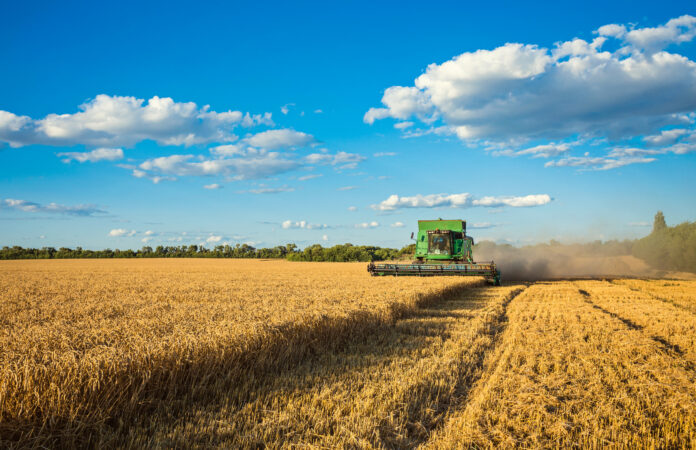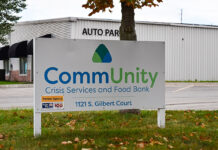
Golden streams of grain pouring from combines and augers into wagons, trucks, bins and elevators are familiar sights all across Iowa each fall. Less visible but no less important is the manufacturing backbone behind the state’s vaunted corn and soybean production. In a month when we give thanks for a bountiful harvest, ABI looks at […]
Want to Read More?
Get immediate, unlimited access to all subscriber content and much more.
Learn more in our subscriber FAQ.
- Unparalleled business coverage of the Iowa City / Cedar Rapids corridor.
- Immediate access to subscriber-only content on our website.
- 26 issues per year delivered digitally, in print or both.
- Support locally owned and operated journalism.
Do you want to read and share this article without a paywall?
Click here to purchase a paywall bypass linkGolden streams of grain pouring from combines and augers into wagons, trucks, bins and elevators are familiar sights all across Iowa each fall. Less visible but no less important is the manufacturing backbone behind the state’s vaunted corn and soybean production.
In a month when we give thanks for a bountiful harvest, ABI looks at three Iowa manufacturers providing inputs and equipment needed to grow and store crops, supporting farmers across the nation and the world beyond.
Helena Industries, Des Moines
“We make chemicals for most of the large agriculture companies that most people are familiar with,” says Shawn Torrez, manager of the Helena Industries plant at the east edge of Des Moines. “That’s the nature of a toll company. We make some kind of herbicide using their chemistry and recipe. Usually, we put it in their container and put their label on it.
Helena’s workforce is diverse, reflecting the demographics of the Des Moines metro, says Mr. Torrez. “People come here from different parts of the world and they look for stable places to work.” Those employees, he believes, are “some of the best in the world” with a strong work ethic and good character. “They expect to get as well as they give.”
Many of the plant’s 175 employees are also farmers, with planting and harvesting schedules that mesh well with Helena’s production cycle. Helena’s employee benefit package is another attraction.
“We are acutely aware of when planting and harvest season is,” says Mr. Torrez. “We are busy in the winter ahead of growing season, working to supply our customers so they can supply farmers before they plant. Our busy season starts to taper off when we see corn and soybeans come out of the ground.”
The plant sits on 96 acres near the city's border with Pleasant Hill and includes some 90% of its production is herbicides for corn and soybeans. Helena also produces adjuvant chemicals that support pesticides.
The basic process is mixing chemicals in large stainless-steel tanks. “It’s like making brownies except we’re making chemicals,” says Mr. Torrez. “Our expertise is in blending. We’re proud of our knowledge.”
A laboratory on site supports the manufacturing process. The plant runs seven to eight major packaging lines, taking the blended chemicals and pumping them into a filler outputting to jugs and totes.
“You see lots of people in uniform. We want to be protected ourselves,” says Mr. Torrez. Safety is one of RAPIDS values promoted by the parent company. The others are Responsive, Attitude, Proactive, Integrity and Dependability. “We think we share the values of Midwest farmers,” Mr. Torrez says.
Ranco Fertiservice, Sioux Rapids
Ranco Fertiservice is another Iowa manufacturer on the input side, fabricating continuous dry-blend fertilizer equipment for national and international markets from its single location in Sioux Rapids.
It’s been a challenging year for Ranco, after late June floods devastated its sheet steel shop and warehouses in the Buena Vista County community of 600 this spring. President and COO Nate Wimmack says his team came together the third day after the flood to clean up and make the important determination “to do whatever we can to improve going forward instead of putting our heads down and letting it be the downfall of us.”
A major decision is already paying dividends. Ranco purchased a laser steel cutting system to replace the plasma system ruined by the flood. “The benefits of laser are tremendous in the quality of cuts, efficiency and accuracy,” says Mr. Wimmack.
An example of efficiency gains is the laser system’s ability to etch numbers on parts as it cuts them, saving Ranco’s crew time labeling cut pieces with Magic Markers.
Significant help from the state is speeding flood recovery. “We were fortunate to work with the Iowa Economic Development Authority to find a program we could qualify for,” says Mr. Wimmack. A $500,000 High Quality Jobs grant helped maintain the workforce and upskill Ranco’s team. The company is applying for an additional state advanced manufacturing grant.
Ranco’s core products are fertilizer blending and handling equipment. Systems and parts are engineered, fabricated and shipped to at least 40 U.S. states, and to Canada and Australia. Parts orders also come from Europe and Africa, though the market for new systems there is no longer active. Among U.S. states, Iowa provides the most volume, “if for no other reason than that we’re local,” says Mr. Wimmack.
The customer base is mainly ag retailers, including co-ops and companies like Nutrien, Helena and Greenpoint — “any place with a facility that blends or dispatches dry fertilizer.” Another segment is wholesale dry fertilizer vendors, which may also sell at retail. These are often river terminals.
Ranco employs about 85 people, mainly in Sioux Rapids, though a few engineers work remotely. “We bring in flat sheet and dimensional steel, do laser cutting, forming and rolling to build equipment from the ground up,” Mr. Wimmack says. Specialized components such as electric motors are purchased from other sources.
“We build a system with multiple hoppers that are typically positioned on the ground inside their facility,” he explains. “Our approach is different than mixing in batches. We blend continuously.”
A big advantage of Ranco’s system is mixing speed, says Mr. Wimmack. “We were for the longest time the only ones in game that offered a continuous solution.”
Demand for Ranco’s systems is tied to the ag economy, but protected from short-term ups and downs by the nature of its clientele.
“What we have found, because our customers are those ag retailers, there is a bit more of a lag, as it relates to our demand,” says Mr. Wimmack. “If there are three or more years of consistent poor years for growers, that ultimately affects decisions of ag retailers.”
Business slowed down in the late-20-teens compared to the middle of that decade, but “things have picked up quite a bit” since 2020, he says. Mr. Wimmack is bullish on his home state’s ag outlook. “As a kid who grew up on a farm in Iowa, I think our productivity in corn and soybeans is second to none. I don’t expect that to change.”
LeMar Industries, Des Moines
“One of the nice things about being within the storage side is that people always need to store grain. There’s no way to get away from that regardless of the ups and downs of the economy,” says LeMar Industries Plant Manager Nicholas Kiederlen.
Founded by Bob and Sharron Martin in 1982, LeMar is a manufacturer specializing in grain handling, structures, and temporary storage solutions. The company became a division of CTB Midwest, a Berkshire Hathaway subsidiary that owns Brock Grain Systems in 2012.
“At our core, we’re a fabrication shop. Our focus is truly manufacturing,” says Mr. Kiederlen.
LeMar’s Des Moines plant makes structural components for grain systems, including stairs, towers and catwalks. “We provide support for everything on a grain site.”
LeMar operates from a northeast Des Moines plant with nearly 100,000 square feet of manufacturing space. “We engineer, design and produce to fit specific client needs,” says Mr. Kiederlen. "We bring in raw steel, ibeams and square tubing, fabricate it in our shop and send out to be installed.”
Headcount fluctuates with the season, peaking at around 95, including engineering, sales, support and production.
“One of things I appreciate about our business model, we have dealers and partners throughout the Midwest that are millwrights and construction crews,” says Mr. Kiederlen. “We depend on them to install our product and service it in the future. “
Iowa’s central, Midwest location is ideal, Mr. Kiederlen says. “Most products end up on a farm that’s grain related. Iowa is the home of grain. It’s the perfect location to be close to dealers and eventual end users” such as co-ops, larger farms and commercial grade sites like ADM facilities.
Most of LeMar’s business is in the Midwest with Iowa accounting for 30-40% of annual sales, but “historically, a pretty decent volume we’ll send to eastern Europe,” Mr. Kiederlen says.
He’s optimistic about prospects for LeMar’s sector of the ag industry. “The fields aren’t going anywhere. I think it’s going to continue to be steady going in to 2025. We see farmers continue to invest in grain storage as tech continues to get better, creating a longer life for the grain that’s being stored.”
One concern that clouds Mr. Kiederlen’s sunny outlook: “Family farms are starting to disappear. There doesn’t seem to be a lot of interest in people going into farming, their sons or daughters taking over. In 20 years, I think the farming landscape will be very different from today.” He’s pleased to see that most Iowa farms don’t go to international entities but are sold to “neighbors and family members.”
Another bright spot for Mr. Kiederlen is the recent push in Iowa to get more people interested in manufacturing. “When I was a kid, manufacturing was seen as dirty, gross, no money in it. When I really got into it, I, learned manufacturing is fun.”
He spends a good bit of time working with schools and community colleges is to carry that message to students. “I just think it’s fantastic, the amount of creativity, ingenuity, finding new ways to make steel fit together. There’s so many things we can do with robotics, automation, how we move materials,” says Mr. Kiederlen. “We are a manufacturer supporting the ag industry. There’s nothing better.”
This article was originally published in the Iowa Association of Business and Industry‘s (ABI) Business Monthly newsletter, which is distributed in print in the Corridor Business Journal and the Quad Cities Regional Business Journal. ABI has served as Iowa’s unified voice for business since 1903. Their mission is to nurture a favorable business, economic, governmental and social climate within the state of Iowa so citizens can have the opportunity to enjoy the highest possible quality of life.




